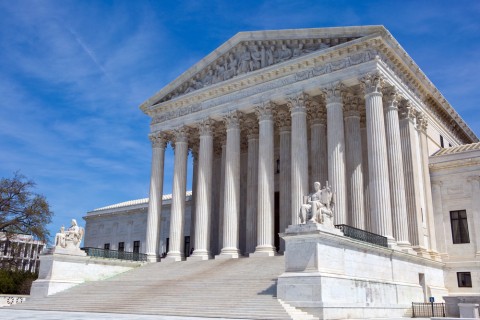Supreme Court Weighs Religious Charters

A closely watched U.S. Supreme Court case could open the door for religious organizations to operate publicly funded charter schools. The outcome could have sweeping implications for charter school governance, religious liberty, and state education policy nationwide.
In 2023, Oklahoma’s Statewide Virtual Charter School Board approved an application from the Archdiocese of Oklahoma City and the Diocese of Tulsa to establish St. Isidore of Seville Catholic Virtual School — the first religious charter school in the nation. Oklahoma law requires that charter schools be nonsectarian, but the board approved St. Isidore’s plan to openly teach the Catholic faith.
Oklahoma Attorney General Gentner Drummond challenged the board’s decision, and the state supreme court agreed, ruling that a public charter school cannot promote religious beliefs. St. Isidore and the board appealed to the U.S. Supreme Court, arguing that the denial violates the First Amendment’s protections for free exercise of religion.
Justice Amy Coney Barrett has recused herself from the case. If the Court splits 4–4, the Oklahoma ruling will stand.
Arguments in favor
Supporters of St. Isidore contend that excluding religious institutions from public programs available to secular organizations is unconstitutional religious discrimination. They argue that Oklahoma’s charter school law, which allows private entities to operate publicly funded schools, must apply equally to faith-based applicants. Denying St. Isidore’s charter, they say, treats religion as a disqualifier.
They point to recent Court decisions—Trinity Lutheran, Espinoza, and Carson—where the Court ruled that states cannot withhold public benefits solely because an applicant is religious. They argue St. Isidore is not seeking preferential treatment but simply access to the same opportunity as other charter operators.
Proponents also suggest that allowing religious charter schools could expand educational choice for underserved communities and faith-based families, especially in rural or virtual settings.
Arguments against
Opponents, including the Oklahoma attorney general and several education and civil rights organizations, argue that charter schools are “state actors” — public institutions operating under state authority and oversight. As such, they are subject to constitutional limits on government conduct, including the Establishment Clause, which prohibits state-sponsored religion.
They warn that allowing religious charter schools could blur the distinction between public and private education and invite legal and logistical conflicts over admissions, staffing, curriculum, and student rights. Disability advocates, for example, note that students in public schools are entitled to special education services under federal law — services that may not be guaranteed in a religious setting.
They also argue that a ruling in favor of St. Isidore could destabilize charter school funding models if courts determine that charter schools are no longer public entities entitled to per-pupil funding.
Where the Justices appear to stand
The justices’ questions revealed deep divisions. Justice Ketanji Brown Jackson noted that St. Isidore seeks to do something no other public charter can—teach a religious curriculum while receiving public dollars. Justice Elena Kagan emphasized the state’s control over charters and cautioned against requiring states to fund religious instruction.
In contrast, Justices Alito, Gorsuch, Thomas, and Kavanaugh appeared more open to the school’s claims. Justice Kavanaugh suggested that the state’s denial could exclude faith-based groups from a generally available program, echoing concerns from earlier cases. Justice Alito raised concerns about whether religious minorities would face unfair barriers in similar circumstances.
Chief Justice John Roberts, likely the deciding vote, challenged both sides and did not clearly reveal his position.
Aligned’s Take: A ruling is expected by late June. A decision in favor of St. Isidore could pave the way for religious charter schools nationwide, which may require states to revisit legal frameworks that currently prohibit public funding of sectarian education. A decision against could reaffirm the secular character of public schools and limit participation in charter programs to nonreligious entities. Whatever the outcome, Oklahoma will be the first state to navigate its practical impact.